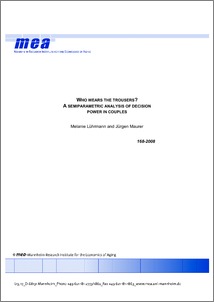|
Who wears the trousers? A semiparametric analysis of decision power in couples
Lührmann, Melanie
;
Maurer, Jürgen
![[img]](https://madoc.bib.uni-mannheim.de/2080/1.hassmallThumbnailVersion/meadp_168_08.pdf)  Vorschau |
|
PDF
meadp_168_08.pdf
- Veröffentlichte Version
Download (1MB)
|
|
URL:
|
https://ub-madoc.bib.uni-mannheim.de/2080
|
|
URN:
|
urn:nbn:de:bsz:180-madoc-20809
|
|
Dokumenttyp:
|
Arbeitspapier
|
|
Erscheinungsjahr:
|
2008
|
|
Titel einer Zeitschrift oder einer Reihe:
|
MEA Discussion Papers
|
|
Band/Volume:
|
168
|
|
Ort der Veröffentlichung:
|
Mannheim
|
|
Sprache der Veröffentlichung:
|
Englisch
|
|
Einrichtung:
|
Fakultät für Rechtswissenschaft und Volkswirtschaftslehre > Sonstige - Fakultät für Rechtswissenschaft und Volkswirtschaftslehre
|
|
MADOC-Schriftenreihe:
|
Veröffentlichungen des MEA (Mannheim Research Institute For the Economics of Aging) > MEA Discussion Papers
|
|
Fachgebiet:
|
330 Wirtschaft
|
|
Fachklassifikation:
|
JEL:
C14 J14 D13 ,
|
|
Normierte Schlagwörter (SWD):
|
Familie , Haushalt , Familienökonomie , Haushaltsökonomie
|
|
Freie Schlagwörter (Englisch):
|
Family Economics , Intra-household bargaining , semiparametric methods , multiple index models
|
|
Abstract:
|
Decision processes among couples depend on the balance of power between the partners, determining the welfare of household members as well as household outcomes. However, little is known about the determinants of power. The collective model of household behavior gives an operational definition of decision power. We argue that important aspects of this concept of power are measurable through self-assessments of partners’ say. Using such a measure, we model balance of power as an outcome of the interplay between both partners’ demographic, socioeconomic, and health characteristics. Advancing flexible, yet parsimonious empirical models is crucial for the analysis, as both absolute status as well as relative position in the couple might potentially affect the balance of power, and gender-asymmetries may be important. Appropriately, we advance semiparametric double index models that feature one separate index for each spouse, which interact nonparametrically in the determination of power. Based on data from the Mexican Health and Aging Study (MHAS), we find education and employment status to be associated with more individual decision power, especially for women. Moreover, health and income have independent effects on the distribution of power. We also show that contextual factors are important determinants of decision power, with women in urban couples featuring more decision power than their rural counterparts.
|
 | Dieser Eintrag ist Teil der Universitätsbibliographie. |
 | Das Dokument wird vom Publikationsserver der Universitätsbibliothek Mannheim bereitgestellt. |
 Suche Autoren in Suche Autoren in
Sie haben einen Fehler gefunden? Teilen Sie uns Ihren Korrekturwunsch bitte hier mit: E-Mail
Actions (login required)
 |
Eintrag anzeigen |
|
|
